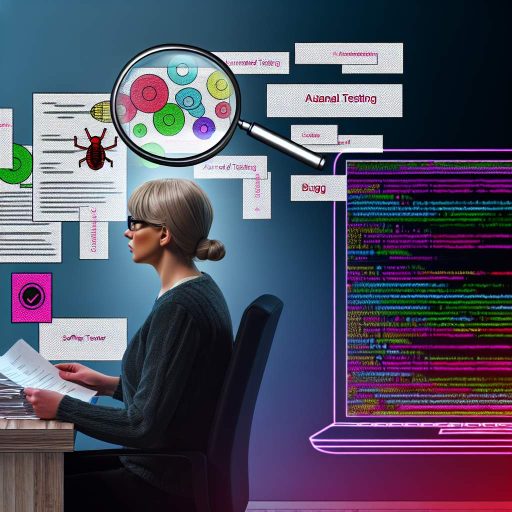Introduction:
Decentralized apps (dApps) are software applications that run on a decentralized network, such as blockchain.
They are significant in the tech industry because they provide a new way of creating and deploying applications without the need for a central authority.
dApps function by using smart contracts to automate processes and transactions on the blockchain.
Their use cases include decentralized finance (DeFi), supply chain management, voting systems, and more.
What is Decentralized Apps (dApps)?
DApps, as the name suggests, are decentralized applications that run on a blockchain network.
Unlike traditional apps, dApps do not rely on a central authority to function.
Key Characteristics of dApps
- Decentralized Governance: One of the key characteristics of dApps is decentralized governance.
- This means that decision-making processes within the application are distributed across network participants.
- Data Storage: Another important feature of dApps is decentralized data storage.
- Instead of storing data on a centralized server, dApps use blockchain technology to store data across multiple nodes on the network.
- Transparency: dApps are transparent by nature.
- All transactions and operations are recorded on the blockchain, making them viewable by anyone on the network.
- Immutability: Once data is stored on the blockchain, it cannot be altered or deleted.
- This ensures the integrity and security of the information stored within the dApp.
- Security: Due to their decentralized nature, dApps are more secure against attacks such as hacking or data breaches.
- There is no central point of failure.
- Interoperability: dApps have the ability to interact and communicate with other dApps and blockchain networks.
- This allows for seamless integration and collaboration between different platforms.
- Censorship Resistance: dApps are resistant to censorship.
- The decentralized nature of blockchain technology prevents any single entity from controlling or restricting access to the application.
- Tokenization: Many dApps have their own native tokens.
- These tokens are used to incentivize network participants and enable transactions within the application.
Overall, dApps offer a new paradigm for application development.
They provide greater security, transparency, and efficiency compared to traditional centralized apps.
Development of Decentralized Apps:
Explaining the process of developing dApps, which involves creating and deploying smart contracts.
Discussing the programming languages commonly used, such as Solidity for Ethereum dApps.
Highlighting the frameworks like Truffle and Embark that simplify dApp development.
Process of Developing dApps:
- Developers start by identifying the problem that their dApp aims to solve.
- They then design the architecture and develop the smart contracts using a language like Solidity.
- After testing the smart contracts, the developers deploy them onto the blockchain network.
Programming Languages and Frameworks:
- Commonly used programming languages include Solidity, JavaScript, and Python.
- Frameworks like Truffle, Embark, and Remix provide tools for dApp development.
- Ethereum is popular for dApp development due to its support for smart contracts.
Challenges Faced by Developers:
- One major challenge is ensuring the security of smart contracts to prevent vulnerabilities.
- Scalability is another issue, as the blockchain network can become slow and costly.
- Interoperability with other blockchains and legacy systems presents technical challenges.
Developing decentralized apps (dApps) involves creating smart contracts, using programming languages like Solidity, and facing challenges like security and scalability.
By leveraging frameworks and best practices, developers can build impactful dApps that contribute to the decentralized ecosystem.
Find Out More: Educational Requirements for Systems Integrators
Tools and Technologies for dApp Development:
– Identify the tools and technologies essential for creating dApps, such as Ethereum and Solidity.
– Discuss the role of blockchain networks in supporting dApp development.
When it comes to developing decentralized applications (dApps), there are specific tools and technologies that are essential for creating successful and robust applications.
Understanding the role of these tools and technologies is crucial for developers looking to create cutting-edge dApps that leverage the power of blockchain technology.
Ethereum:
Ethereum is one of the most popular platforms for developing dApps.
It allows developers to create smart contracts that run on the Ethereum Virtual Machine (EVM).
Transform Your Career Today
Unlock a personalized career strategy that drives real results. Get tailored advice and a roadmap designed just for you.
Start NowThese smart contracts enable decentralized applications to execute code autonomously and securely without any downtime, fraud, or interference from third parties.
Solidity:
Solidity is the programming language used to write smart contracts on the Ethereum platform.
It is a statically-typed language designed for developing smart contracts that run on the EVM.
Solidity is essential for creating complex dApps that require autonomous and secure execution of code.
Blockchain Networks:
Blockchain networks play a critical role in supporting dApp development.
These networks provide the infrastructure needed to validate transactions, secure data, and ensure the integrity of smart contracts.
By leveraging blockchain technology, dApp developers can create decentralized applications that are transparent, secure, and tamper-proof.
Understanding the tools and technologies essential for dApp development is the key to creating innovative and successful decentralized applications.
By leveraging platforms like Ethereum, programming languages like Solidity, and the power of blockchain networks, developers can build dApps that revolutionize industries and drive the adoption of decentralized technologies.
Learn More: Leveraging AI and ML in IT Training Programs
Best Practices for Building dApps:
Ensure code is secure by using best security practices such as encryption and smart contract auditing.
Regularly update your dApp to fix any vulnerabilities that may arise.
Implement a multi-signature feature to add an extra layer of security.
Importance of Auditability and Transparency in dApp Development:
Auditing your smart contracts ensures that they function as intended and are free from bugs.
Transparency in dApp development builds trust with users and stakeholders.
Keep detailed records of all transactions and interactions within the dApp for accountability.
Find Out More: How to Become a Digital Transformation Specialist

Examples of Successful dApps:
- Showcase some popular dApps that have gained widespread adoption.
- Analyze the features that make these dApps successful and user-friendly.
Decentralized Finance (DeFi):
DeFi has emerged as a major use case for dApps.
Platforms like Uniswap, Compound, and MakerDAO are leading the way.
Showcase Your Business Today
Reach thousands of readers actively exploring professional services. Publish your business profile and grow your audience now.
Publish NowThese dApps allow users to borrow, lend, and trade assets.
They operate without the need for traditional financial intermediaries.
The success of DeFi dApps can be attributed to their transparency, efficiency, and accessibility.
By leveraging blockchain technology, these platforms provide users with greater control.
They also offer lower fees and faster transaction times.
This has led to a surge in adoption.
More people recognize the benefits of decentralized finance.
Social Media Platforms:
Several dApps have been developed to create decentralized alternatives.
These alternatives replace traditional social media platforms like Facebook and Twitter.
Examples include Steemit, a blogging platform that rewards users.
Minds is also a privacy-focused social network.
These dApps offer users greater control over their data and content.
They provide the ability to monetize their contributions.
The success of these platforms lies in their focus on privacy.
Censorship resistance and community-driven governance are also key factors.
Users appreciate the transparency and autonomy that decentralized social media platforms provide.
This has led to their growing popularity.
Gaming dApps:
Gaming is another area where dApps have seen significant success.
Platforms like Axie Infinity and Gods Unchained are gaining traction among gamers.
These dApps offer players true ownership of in-game assets.
Players can trade these assets on open marketplaces.
The decentralized nature of these platforms ensures fairness and security.
Transparency in gameplay is also a strong feature.
Moreover, players can earn real rewards in the form of cryptocurrency.
This creates a new paradigm for gaming economics.
The success of gaming dApps is driven by their innovative gameplay mechanics.
Tokenized economies and community engagement also play critical roles.
Decentralized Autonomous Organizations (DAOs):
DAOs are another category of dApps that have garnered attention.
They are known for their innovative organizational structure.
Platforms like Aragon and DAOstack enable communities to govern themselves.
They do this through decentralized decision-making processes.
DAOs operate on blockchain technology.
This allows members to vote on proposals and allocate funds.
They can participate in governance activities without centralized authorities.
The success of DAOs lies in their ability to foster collaboration.
Transparency and trust within communities are also key advantages.
By decentralizing decision-making, these platforms empower users.
Users can collectively manage resources and drive projects forward.
Gain More Insights: Understanding User Requirements as a Systems Analyst
Future Trends in dApp Development:
As decentralized applications (dApps) continue to gain traction, it’s essential to explore the potential growth of dApps in various industries, such as finance and gaming.
Showcase Your Business Today
Reach thousands of readers actively exploring professional services. Publish your business profile and grow your audience now.
Publish NowThese sectors are witnessing a significant shift towards integrating blockchain technology to enhance efficiency and security.
- Finance Industry:
- Gaming Industry:
The finance industry is one of the early adopters of blockchain technology and dApps.
The use of decentralized finance (DeFi) applications has been on the rise, enabling users to access financial services without the need for traditional intermediaries.
This trend is expected to continue growing as more people seek alternatives to traditional banking systems.
Another industry that is poised for significant growth in dApp development is the gaming sector.
Blockchain-based games are gaining popularity due to their unique benefits, such as digital asset ownership, provably fair gameplay, and seamless monetization options.
The integration of dApps in gaming is expected to revolutionize the industry by providing players with more control over their in-game assets.
Emerging Technologies Impacting dApp Development:
Several emerging technologies have the potential to impact the development of dApps in the future.
These innovations are set to enhance the scalability, security, and user experience of decentralized applications.
- Layer 2 Solutions:
- Oracles:
- Interoperability:
Layer 2 solutions, such as sidechains and state channels, are being developed to address the scalability issues faced by blockchain networks.
These technologies enable faster and more cost-effective transactions, making it easier for dApp developers to build scalable and user-friendly applications.
Oracles play a crucial role in connecting smart contracts with real-world data.
By providing external information to the blockchain, oracles enable dApps to access off-chain data and trigger events based on real-time information.
This technology enhances the functionality and reliability of decentralized applications.
Interoperability solutions are being developed to facilitate seamless communication between different blockchain networks.
This technology allows dApps to interact with multiple blockchains, enabling cross-chain functionality and boosting the overall usability of decentralized applications.
The future of dApp development looks promising, with continued growth expected across various industries.
By leveraging emerging technologies and exploring new use cases, developers can unlock the full potential of decentralized applications in the coming years.
Decentralized Applications and Their Impact
Decentralized apps (dApps) offer transparency, security, and autonomy through blockchain technology.
Understanding dApp development is crucial in navigating the rapidly evolving tech landscape.
By grasping the fundamentals of dApp development, individuals and businesses can harness the potential of decentralized applications.
They can revolutionize various industries with their implementation.
Enhanced security measures, reduced operational costs, and increased efficiency are some of the key benefits of dApps.
Moreover, staying informed about the latest trends can provide a competitive edge in the market.
As blockchain technology continues to disrupt traditional systems, the demand for skilled dApp developers will only increase.
Investing time and resources in understanding dApp development is not only prudent but also essential for future tech industry success.
The significance of grasping dApp development cannot be overstated.
It opens up a world of possibilities and opportunities for innovation and growth.
Additional Resources
What is a dApp (Decentralized Application)?
What does matter in the success of a decentralized application …
[E-Books for Sale]
The Big Book of 500 High-Paying Jobs in America: Unlock Your Earning Potential
$19.99 • 500 High-Paying Jobs • 330 pages
Explore 500 high-paying jobs in America and learn how to boost your career, earn more, and achieve success!
See All 500 High-Paying Jobs of this E-Book
1001 Professions Without a Degree: High-Paying American Jobs You Can Start Now
$19.99 • 1001 Professions Without a Degree • 174 pages
Discover 1001 high-paying jobs without a degree! Unlock career tips, skills, and success strategies for just $19.99!




